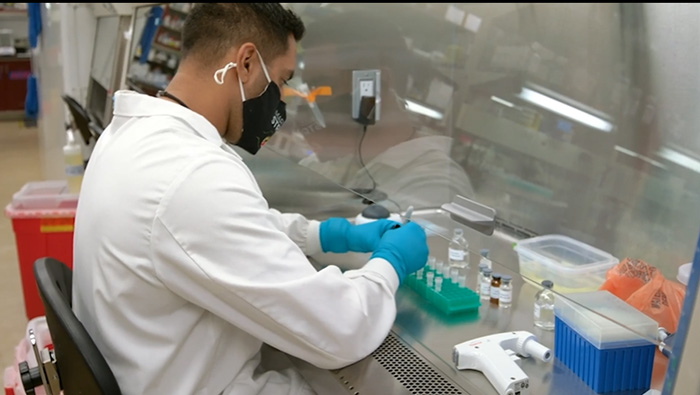Contracting Summit Digs into Details, Opens Doors

Representatives from the U.S. Army Medical Research and Development Command's U.S. Army Medical Research Acquisition Activity held their annual Contracting Officer Representative and Grants Officer Representative Summit from May 5-6. The annual event – held this year in a fully virtual setting due to complications from the enduring novel coronavirus pandemic – allowed USAMRAA personnel to meet with key contracting officials from across USAMRDC and beyond to highlight current challenges and develop solutions.
"It's seen as our one flagship annual training event that we have for all of our customers," said Jeffery Croley, chief of contracting for USAMRAA. "It's an opportunity for the contracting side to put out new information in areas where we see weaknesses across the Command – and then develop training programs for those areas."
The event, which began in 2017 and has since seen a steady increase in attendance each year according to organizers, has become one of the lynchpin events for USAMRAA, which – in its unique role as USAMRDC's contracting and assistance agreement element – handles the contracting work for all research, support, and equipment requests within the Command. In addition, USAMRAA also performs contracting work for the Defense Health Agency and the U.S. Department of Homeland Security.
Specifically, the event – known colloquially as simply the "COR/GOR Summit" – focuses on training efforts for both contracting officer representatives and grants officer representatives in areas such as acquisition strategy and planning, the negotiation of costs and conditions, and general ethics, among a myriad other areas. More broadly however, the event serves as a platform to discuss hot topics and emerging areas of interest both with and amongst federal customers through a series of presentations, guest speaker appearances, panel discussions, and networking events.
"It's another way to enhance the communication with our customers here within the Command," said David Ruane, chief of the grants division at USAMRAA. "It allows us to present on various issues that get identified over the course of the year where we've established there's a need to communicate – or maybe even communicate something more clearly."
"I look at it sort of like stovepipes," said John Niziolek, chief of group services at USAMRAA, coining a comparative phrase. "Each one of our customers are sort of stove-piped, and all the various labs are doing their respective work each day, [and so] the summit sort of removes all the stovepipes and flattens everything out and allows for increased conversation."
Indeed, one of the chief topics of conversation at this year's event according to organizers was the use and applications of the Other Transaction Authority agreement. The OTA a unique and powerful tool which allows federal agencies to operate a solicitation and award process in a more open, transparent, and collaborative manner, tearing down traditional acquisitions barriers restricting government-industry interactions. It was initially created to give the U.S. Department of Defense and its associated agencies the flexibility necessary to adopt and incorporate business practices that reflect commercial industry standards into its award instruments. Notably, OTAs are routinely used by USAMRDC partner the Medical Technology Enterprise Consortium, which operates as a nonprofit corporation designed to accelerate the translation of medical technologies into medical solutions for U.S. military personnel and veterans.
"A lot of people are extremely eager to learn about OTAs," said Croley, noting in summit literature that DOD OTA obligations skyrocketed more than 700 percent between fiscal years 2015 and 2019. "And so our focus this year was to continue to educate the command on what OTAs are, exactly, and when it's appropriate to use them."
More than 300 people attended portions of the 2021 COR/GOR Summit according to USAMRAA. While organizers hope to return to the event's standard three-day operating schedule next year, they believe participation numbers and still-evolving customer feedback from the most recent iteration cement the event as an overwhelming victory in what has been an otherwise challenging – and crucial – calendar year for USAMRDC.
Said Niziolek, "Knowing at USAMRAA that we're in sync with each other with regards to what each one of us are doing, it's good for the Command to see there is conversation that goes on with us, and [that] we see similarities and problems that need to be addressed."
 An official website of the United States government
An official website of the United States government
 ) or https:// means you've safely connected to the .mil website. Share sensitive information only on official, secure websites.
) or https:// means you've safely connected to the .mil website. Share sensitive information only on official, secure websites.


